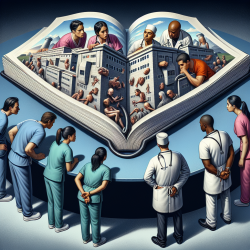The provision of healthcare to incarcerated individuals presents unique challenges and opportunities for medical trainees. A recent study titled “It’s like heaven over there”: medicine as discipline and the production of the carceral body provides valuable insights into these dynamics. The research highlights the ethical complexities and power imbalances inherent in correctional healthcare settings, urging practitioners to develop a deeper understanding and specialized skills to address these issues effectively.
The Ethical Dilemma in Correctional Healthcare
The study reveals that medical trainees often benefit from a system that exploits the neglected health of incarcerated patients for educational purposes. The advanced pathologies seen in these patients provide rich learning opportunities but also highlight a significant power differential between provider and patient. This differential can lead to ethical dilemmas where trainees may unknowingly perpetuate exploitation.
Incarcerated patients often exhibit easy compliance and gratefulness, which can be misinterpreted by trainees as genuine consent. However, this compliance is frequently a result of institutional neglect and a lack of autonomy. The study emphasizes the need for specialized training that equips medical professionals with the skills to recognize and navigate these complex dynamics ethically.
The Need for Specialized Training
The research underscores the importance of implementing vulnerable-population training for both medical trainees and attending physicians. Such training should focus on:
- Recognizing the unique vulnerabilities of incarcerated patients.
- Navigating the power dynamics between provider and patient.
- Acknowledging the historical context of medical exploitation in correctional settings.
- Developing empathy and understanding towards patients with complex backgrounds.
This specialized training is crucial to prevent further exploitation and ensure that healthcare delivery aligns with ethical standards. It also prepares practitioners to provide care that respects the dignity and rights of all patients, regardless of their incarceration status.
Encouraging Further Research
The study encourages practitioners to engage in further research to deepen their understanding of correctional healthcare dynamics. By exploring these issues more comprehensively, medical professionals can contribute to developing better training programs and policies that address the unique needs of incarcerated populations.
Further research can also illuminate areas where current practices fall short, offering opportunities for improvement and innovation in healthcare delivery within correctional facilities. Practitioners are urged to collaborate with researchers, policy-makers, and educators to drive meaningful change in this field.
A Call to Action
The findings from this study serve as a call to action for all involved in correctional healthcare. By acknowledging the power imbalances and ethical challenges present in these settings, practitioners can work towards creating a more just and equitable healthcare system for incarcerated individuals.










